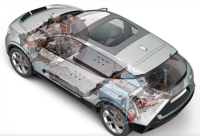How to Increase Electric Car Battery Life
Tips & Best Practices
Introduction: Why Battery Life Matters in Electric Vehicles (EVs)
Battery life is one of the most critical factors for electric car owners. Extending your EV’s battery lifespan helps retain vehicle performance, reduce maintenance costs, and preserve resale value. With the growing popularity of EVs, it’s crucial to understand how to maintain and optimize the battery’s health.
In this article, we provide practical strategies and best practices to help you increase your electric car’s battery life, ensuring your vehicle runs efficiently for years.
How Long Do Electric Car Batteries Last?
Most modern EV batteries are designed to last 8 to 15 years or about 100,000 to 200,000 miles before they degrade significantly. However, the longevity of the battery depends on several factors, including:
- Driving habits
- Temperature exposure
- Charging behavior
Many automakers offer battery warranties that cover a minimum of 8 years, giving owners peace of mind. However, following proper maintenance practices can help extend battery life well beyond the warranty period.
Top 10 Tips to Increase Electric Car Battery Life
Here are practical tips and best practices to maximize the performance and longevity of your EV battery:
1. Avoid Frequent Fast Charging
While DC fast chargers are convenient for road trips, using them too often can degrade the battery. Fast charging generates more heat, which can negatively impact battery health over time. Whenever possible, use Level 2 home chargers for daily charging.
2. Keep Your Battery Charge Between 20% and 80%
Charging your EV to 100% or letting it drop below 10% can put strain on the battery. Most manufacturers recommend keeping the state of charge (SoC) between 20% and 80% to reduce battery stress.
3. Avoid Extreme Temperatures
Batteries perform best in moderate temperatures. Extreme cold or heat can accelerate battery degradation. Park your car in a garage or shaded area when possible, and pre-condition the battery before driving in extreme conditions.
4. Use Regenerative Braking Effectively
Many EVs offer regenerative braking, which helps recharge the battery while slowing down the vehicle. Learning to drive efficiently with regenerative braking can enhance range and reduce energy consumption.

5. Drive Smoothly to Conserve Energy
Sudden acceleration and hard braking consume more energy. Smooth and predictable driving habits help conserve energy and extend battery life. Use eco-driving modes when available to maximize efficiency.
6. Schedule Regular Software Updates
Many EV manufacturers release over-the-air (OTA) software updates to improve battery management and efficiency. Make sure your car receives these updates to optimize performance and prolong battery life.
7. Monitor Tire Pressure
Low tire pressure increases rolling resistance, which can reduce range and force the battery to work harder. Check your tire pressure regularly and keep it within the recommended levels.
8. Use Climate Control Efficiently
Using air conditioning or heating excessively can drain the battery. Instead of setting extreme temperatures, use seat warmers or ventilated seats, which consume less energy. Pre-condition the cabin while the car is still plugged in to conserve battery during the drive.
9. Plan Your Routes for Efficient Driving
Using a navigation system with route optimization can help you avoid traffic, steep hills, and unnecessary stops. This conserves energy and reduces the strain on your battery during daily commutes.
Explore the Best Route Planning Apps for EVs
10. Store Your EV Properly During Inactivity
If you plan to park your EV for an extended period, leave the battery charge at 50%. Avoid leaving the car plugged in or letting the battery drain completely, as both situations can impact battery health.
How Charging Habits Impact Battery Life
Your charging routine plays a key role in the longevity of your EV battery. Follow these additional guidelines for better charging habits:
- Charge Overnight at Home: Level 2 home charging is slower but much safer for long-term battery health.
- Use Smart Chargers: Some smart chargers can automatically stop charging once the battery reaches 80%.
- Public Charging Networks: Avoid relying too much on DC fast chargers for daily use to prevent battery stress.
Do Electric Car Batteries Degrade Over Time?
Yes, like all lithium-ion batteries, EV batteries degrade over time. Most batteries lose about 2-3% of their capacity annually, depending on usage patterns. However, with proper care, this degradation can be minimized.
Many EVs come with battery management systems (BMS) to monitor and optimize the battery’s health. Owners who follow best practices will likely see minimal impact on performance even after years of use.
Can You Replace an Electric Car Battery?
Yes, electric car batteries can be replaced, but it can be expensive. Depending on the make and model, the cost of a replacement battery ranges from $5,000 to $15,000. However, as technology advances, prices are expected to drop.
Pro Tip: Consider extended warranties or battery recycling programs offered by automakers to reduce replacement costs.
Top Electric Car Brands with Reliable Battery Performance
- Tesla: Offers the longest range and excellent battery management systems.
- Nissan: Known for its reliable and affordable battery packs in models like the Nissan Leaf.
- BMW: Features advanced thermal management systems in the i3 and i4 models.
- Hyundai: Provides robust warranties and battery degradation guarantees.
- Rivian: Specializes in durable batteries for off-road vehicles like the R1S.
FAQs About Increasing EV Battery Life
1. How long does an electric car battery last?
Most EV batteries last between 8 to 15 years before significant degradation occurs.
2. Is fast charging bad for my battery?
Frequent use of fast charging can degrade the battery over time, but occasional use is fine.
3. Can I overcharge my electric car?
Most modern EVs have battery management systems to prevent overcharging.
Conclusion: Take Care of Your EV Battery for Long-Term Savings
Following these tips will help you increase your electric car battery life and reduce the need for expensive replacements. From proper charging habits to efficient driving techniques, small changes can make a big difference in battery longevity.
By maximizing your battery’s health, you’ll not only save money but also ensure your vehicle remains environmentally friendly for years to come.
